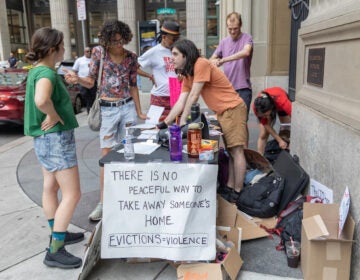Philly’s for-profit eviction system shut down a year ago. Are things any better?
After a string of shootings, the Philadelphia Sheriff’s Office is now the only entity performing evictions in the city.

Rowhouses in North Philadelphia. (Bastiaan Slabbers for WHYY)
Have a question about Philly’s neighborhoods or the systems that shape them? PlanPhilly reporters want to hear from you! Ask us a question or send us a story idea you think we should cover.
For more than 50 years, evictions in Philadelphia were performed by two entities — one public and one private.
Deputies with the Philadelphia Sheriff’s Office carried out some lockouts. But the vast majority of them were completed by armed contractors hired by the Landlord and Tenant Office, a private outfit led by a court-appointed attorney.
Until last year. Following a string of high-profile shootings, the LTO was forced to shut down and evictions became the sole purview of the sheriff’s office, an outcome housing advocates celebrated.
Have things improved since then? Here’s what we know.
‘Not a single shot’
The Landlord and Tenant Office was officially shuttered last September after it was unable to secure the liability insurance it needed to continue operating. Experts said the shootings, which landed two tenants in the hospital, undoubtedly contributed to that outcome by raising the risk for insurers, largely because both filed lawsuits.
Angel Davis sued after she was shot in the head by a deputy landlord-tenant officer during an attempted lockout at a North Philadelphia apartment complex. She continues to recover from a traumatic brain injury.
A few months later, a contractor with the LTO shot Latese Bethea in the leg during an attempted lockout in Kensington.
Since the office shut down, there have been no reports of a tenant being shot by a detective with the sheriff’s office during a court-ordered lockout, according to the Philadelphia Police Department.
Detectives, not deputies, are now responsible for performing evictions through the sheriff’s office Eviction Integrity Unit.
“There has been no use of lethal force since the sheriff’s office took on this responsibility. Not a single shot has been fired,” Sheriff Rochelle Bilal said in an interview.
Sherry Thomas, director of the housing initiative at the Legal Clinic for the Disabled, said more transparency around lockout dates has likely contributed to fewer violent incidents. She and other attorneys can now call the sheriff’s office and find out when their client’s lockout is scheduled.
Tenants can also call or email the sheriff’s office for that information. Renters can additionally send over any agreement reached with their landlord around their departure date — so deputies and detectives don’t mistakenly attempt a lockout.
By comparison, the Landlord and Tenant Office often refused to share that information, creating an element of surprise that could easily escalate a situation already fraught with emotion.
“That’s a pretty major shift,” Thomas said. “That unpredictability really caught people in situations where they weren’t able to plan properly. And when you can’t plan properly, it creates a more stressful situation and people can act erratically when crisis situations arise like that.”
Bilal agreed, saying the advanced notice helps “prevent confusion” and reduces the “risk of confrontation.”
“This transition has been a major undertaking. But it has also been an opportunity for the sheriff’s office to bring structure, professionalism and accountability to the eviction process. We remain committed to balancing the rights of property owners with the dignity and safety of all residents that are involved,” she said.
Lockouts are taking longer
The LTO was popular among landlords largely because it conducted lockouts more quickly and for less money than the sheriff’s office.
That remains true today and it’s become a source of frustration, particularly for small landlords.
Paul Cohen, general consul for HAPCO Philadelphia, the city’s largest advocacy group for landlords and property managers, said it can take anywhere between six weeks and three months for the sheriff’s office to perform an eviction.
With the LTO, it would take 10 days on average.
“Every day that the eviction gets dragged out is a day that the landlord is losing additional revenue,” Cohen said. “When landlords lose money, they pass those costs onto the tenants.”
That typically translates to raising the rent, but it can also have more indirect consequences. For example, a landlord may add a layer of scrutiny to the screening process for prospective tenants in an effort to avoid signing a lease with another problematic tenant.
That could make it harder for some renters to find a place.
“If somebody was borderline, they might take a chance with that person knowing if they didn’t pay, they could evict them in a certain amount of time. Now, you put in a bad tenant that’s not paying, it becomes devastating, especially for a small landlord,” Cohen said.
He also argues that a longer timeline could shrink the city’s supply of affordable housing amid an ongoing crisis. That’s because a landlord or property owner may decide to make their units market-rate to make up for the money they’ve lost from a tenant not paying.
“I don’t necessarily fault them,” Cohen said of the sheriff’s office. “But in the same token, the city should have done something to make sure that the lockouts were taking place within a reasonable amount of time. So if they needed to hire more staff or whatever else they needed to do, they should be doing it.”
Before the LTO shut down, the sheriff’s office was scheduling about 25 evictions each week. That total has since quintupled to more than 140.
To meet the increased demand, the office added to the number of employees dedicated to evictions. The eviction unit now has 16 staffers — six more than it did when the Landlord and Tenant Office was operating.
Bilal intends to request funding for more staffers during the upcoming budget cycle, in part to reduce wait times around lockouts.
“We’re working as fast as we can,” she said.
“We don’t want to do evictions haphazardly. We still want to do them safely and compassionately. So as the city allows us to increase our staff, we are going to increase the amount that we schedule on a daily and weekly basis,” added Inspector David Fallen.
Diversion program unaffected by transition
The city’s diversion program has not been impacted by the closure of the Landlord and Tenant Office.
Launched five years ago, the pandemic-inspired initiative continues to be an important tool for resolving these disputes outside of court, whether that’s achieved through mediation, direct negotiation or another avenue.
For example, the agreement rate when both parties participated in mediation was 68% last year, according to city data. That figure was at 71% as of the end of September.
Sue Wasserkrug, director of mediation at Good Shepherd Mediation, which helps manage the city program, said there appears to be less skepticism among landlords than when the program first started.
“It does seem like there has been much more understanding of the benefits that this program can bring them in terms of trying to keep things out of court,” Wasserkrug said.
In 2023, the city rolled out the Targeted Financial Assistance program to help resolve disputes involving back rent. Under the program, landlords can receive a one-time payment to cover a tenant’s total rent arrears, plus two month’s rent.
The maximum eligible arrears is now $3,500.
Wasserkrug said the funding has been essential.
“Most of the time, people are being evicted because they’re living paycheck to paycheck and something happens. A kid gets sick and the health insurance doesn’t cover the medication or the car breaks down and there’s a big repair bill. And then they fall behind in rent. It’s not an ongoing thing,” she said.
The first budget proposal for Mayor Cherelle Parker’s signature housing plan calls for another $15 million for the assistance program.
The program started with $30 million to cover two years.

Subscribe to PlanPhilly
WHYY is your source for fact-based, in-depth journalism and information. As a nonprofit organization, we rely on financial support from readers like you. Please give today.









